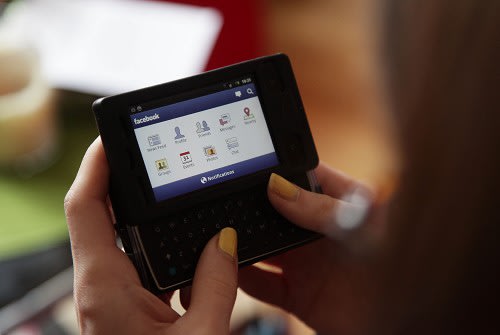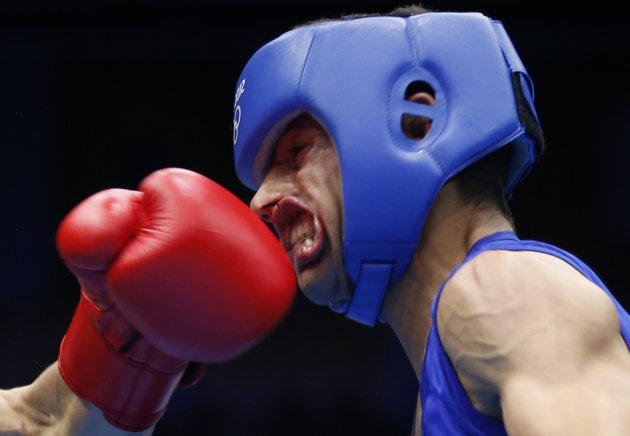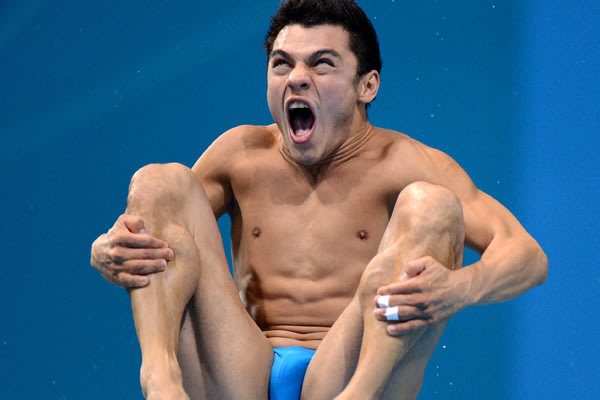
BERLIN/SEOUL (Reuters) - Samsung Electronics became the first handset maker to announce a smartphone using Microsoft's latest mobile software, making its surprise, hurried announcement just days before the highly anticipated launch of Nokia's version. The brief announcement on Wednesday at a Berlin electronics show comes amid expectations that smartphone makers may turn increasingly to Windows devices after a U.S. jury decided many of Samsung's Google (NSQ:GOOG - News) Android-based phones infringed Apple Inc (NSQ:AAPL - News) patents. "It looks like a good phone, and seems like a pre-emptive announcement ahead of Nokia," said Sid Parakh, an analyst at investment firm McAdams Wright Ragen, of the Samsung phone. "Microsoft or Windows never got their best teams, never got their best designs, just because Android was doing so well. With the change in the legal environment, there's a case to be made that Samsung will likely shift some of those resources to broaden out or diversify their own exposure." Nokia, the ailing Finnish mobile firm, once the world's leading producer of phones but now struggling to reverse losses, is due to unveil its new Lumia line of smartphones using Windows Phone 8 in New York on September 5. Samsung's new phone called ATIV S -- tacked onto the end of a long news conference in Berlin that focused on other products -- may elevate expectations for the Lumia. Samsung's ATIV S Windows phone sports a high-end 4.8-inch display, Corning "Gorilla" glass, and an 8-megapixel rear camera and 1.9-megapixel front-facing camera, Microsoft posted on its official blog on Wednesday. "Expectations for a 40 megapixel or possibly 20 megapixel camera model are running high. If Nokia does not unveil a monster camera handset next week, many will be disappointed," said Tero Kuittinen, analyst at mobile analytics firm Alekstra. But "this leaves Nokia plenty of room to draw a clear contrast with its upcoming announcement." Samsung's Windows-based smartphone, introduced on Wednesday, marks the first in a "big lineup of new hardware" from the South Korean company based on Microsoft's software, Microsoft executive Ben Rudolph said in a blog posting. Analysts say the introduction of Samsung's Windows phone may be designed to assuage concerns that Microsoft will favor Nokia, whose Chief Executive Stephen Elop -- himself a former senior Microsoft executive -- has staked its future on the Windows platform. "The fact Samsung was allowed to be the first to announce is Microsoft's backhanded way of letting other vendors know that Nokia is not getting special treatment," Current Analysis analyst Avi Greengart said. But Jack Gold, an independent mobile consultant who runs J. Gold Associates, argued Samsung had signalled its commitment to Windows for a while, but Nokia will remain the primary driver of the new breed of Microsoft-powered devices. "Samsung has crossed the start line first and set the bar for Nokia's launch," said Geoff Blaber, analyst at CCS Insight. STEALING A MARCH Microsoft gave a preview of its Windows Phone 8 software in June, and promised the first phones would be on the market by the autumn. Windows Phone 8 looks similar to, and is built on the same core code as Microsoft's upcoming Windows 8 operating system, but is not the same product. Windows 8, which will run on tablets and PCs, is scheduled to launch on October 26. Samsung said the ATIV phone would hit stores in the October-November period but did not give an exact start date. On Wednesday, the Korean corporation also showed off a slew of tablets using Windows 8 software and the second generation of its popular Google Android-based Galaxy Note phone-cum-tablet "phablet" in downtown Berlin. Samsung has sold some 10 million of its original Galaxy Note devices, creating a new product category which has smaller screen than tablets, but bigger than smartphones. "I am pretty confident it will even outsell its predecessor," said JK Shin, Samsung's chief of mobile business. Samsung hopes the new device will take the focus away from its loss of the court case. Apple is now seeking speedy bans on the sale of eight Samsung phones, moving swiftly to turn legal victory into tangible business gain. Samsung hopes the phablet upgrade will lift any post-Apple gloom. The new version of the Note features a thinner and slightly bigger 5.5-inch screen, quad-core processor, the latest version of the Android operating system called Jellybean, and improved stylus function. "There won't be huge innovative changes in design, but the Note 2 will feature quite a few improvements and enable Samsung to carry on its strong sales momentum in the category," said Lee Sun-tae, an analyst at NH Investment & Securities. "With the launch, Samsung will also be trying to turn around downbeat sentiment after the U.S. legal defeat." Apple did not include the Note and other newly unveiled Samsung products in its original lawsuit. But the company and its lawyers are expected by many legal experts to try and use last week's legal victory to go after future gadgets, especially because the jury found infringing features in Samsung phones such as pinch-and-zoom and bounce-back -- common in Android. Shares of Microsoft finished up 2 cents at $30.65 on Wednesday. (Reporting by Harro ten Wolde and Tarmo Virki in Berlin, Bill Rigby in Seattle, Miyoung Kim in Seoul; Editing by Edwin Chan and Tim Dobbyn) |
Ads
Samsung unveils Windows phone, new Galaxy Note
1:33 PM | 0 Comments
Movie stars’ lesser-known siblings
| "It's not what you know, it's who you know'. This is especially true in Hollywood. Contacts are the way to the top and who better than an A-list brother or sister to give you a leg up? Some of the most successful Hollywood stars, from Scarlett Johansson to Jessica Alba, have siblings quietly toiling away in the less glitzy side of showbiz. They include… Frank Stallone The brother of 'The Expendables' curator Sylvester, Frank Stallone has enjoyed a lengthy career of his own thanks to his singing talent. Sly used his vocals in several 'Rocky's and he contributed 'Far from Over' to the soundtrack of his brother's terrible 'Saturday Night Fever' sequel 'Staying Alive', which made the charts. He's also dabbled in celebrity wrestling, amateur boxing and was the punch line of a long-running gag on SNL. Truly a 'renaissance man'.  Let's be Frank... Frank Stallone and his brother Sylvester (Copyright: WENN) Let's be Frank... Frank Stallone and his brother Sylvester (Copyright: WENN)Bill Cusack We couldn't find out much about the lesser known Cusack. Suspiciously he did show up in brother John's actioners 'Grosse Point Blank' and 'Con Air', where he played a waiter and 'Paramedic #2' respectively. They don't sound like the biggest roles. He's also appeared in the odd non-John project, such as 'The Fugitive' and 'Ed Wood'. A mysterious figure.  Paying the Bills... Bill Cusack and John Cusack (Copyright: WENN) Paying the Bills... Bill Cusack and John Cusack (Copyright: WENN)Vanessa Johansson It must be tricky living in the shadow of one of Hollywood's hottest starlets, but this member of the Johansson clan has carved out a minor movie career of her own. Scarlett's older sister starred in several tongue-in-cheek films, with 'Sharks In Venice' - alongside fellow minor sibling Stephen Baldwin – surely the best.  Blonde ambition... Vanessa and Scarlett Johansson (Copyright: REX/WENN) Blonde ambition... Vanessa and Scarlett Johansson (Copyright: REX/WENN)Doug Pitt Brad's unknown younger brother Doug stepped into the spotlight for the first time in July when he starred in a new advert for Virgin Mobile. The hilarious video shows that good looks and sex appeal don't always run in the family, as Doug goes about his daily business mowing his lawn, making a lasagne and relaxing in his 'man room'.  A Doug's life... Doug and brother Brad Pitt (Copyright: WENN) A Doug's life... Doug and brother Brad Pitt (Copyright: WENN)Charlie Murphy One of the more talented siblings on this list. You may recognise him from the legendary 'I'm Rick James, b***h!' sketches from the 'Chappelle Show'. He's also showed up in 'Norbitt' and 'Grand Theft Auto: San Andreas'. According to brother Eddie, he used to be in a gang, going by the name 'Omar'.  Murphy's law... Charlie and Eddie Murphy (Copyright: WENN) Murphy's law... Charlie and Eddie Murphy (Copyright: WENN)Andrew Wilson Owen Wilson's big brother has also done pretty well for himself. His CV includes 'The Royal Tenenbaums', 'Charlie's Angels' and 'Whip It!'. Two things we like about Andrew; he apparently has a BB pellet (fired by Owen) lodged in his hand, and looks like a cross between his younger brother and 'American Pie's Seann William Scott.  Dead ringer... Andrew and Owen Wilson (Copyright: WENN) Dead ringer... Andrew and Owen Wilson (Copyright: WENN)Alex Watson Alexander Chris Watson is a British actor/model and was (probably not coincidentally) cast as an extra in the first two 'Harry Potter' films alongside starlet sister Emma. Those are his only major film credits but he also appeared with his sister in a photo shoot for fashion label Burberry. His hidden talent is "speaking backwards", apparently.  Sexy siblings... Alex and Emma Watson (Copyright: WENN) Sexy siblings... Alex and Emma Watson (Copyright: WENN)Dave Franco Hollywood star James Franco's little brother has made a decent name for himself as an actor. The drug-dealing rich kid befriended by Jonah Hill in the brilliant '21 Jump Street'? That was our Dave, though he's much older in real life (27). Also appeared in 'Greenberg', 'Charlie St. Cloud' and a load of other stuff.  Lookalikes... Dave and James Franco (Copyright: WENN) Lookalikes... Dave and James Franco (Copyright: WENN)Joshua Alba Joshua Alba landed his first showbiz role in James Cameron's cancelled US TV show, 'Dark Angel' where he starred alongside is MUCH more famous sibling Jessica. His only other notable credits since getting a leg up from his sister include 'Alpha Dog' and voicing the Zack Maio character in the 'Need for Speed: Undercover' video game. According to IMDb he was once an estate agent, but we're not sure if this Linkedin profile is actually him.  Helping hand... Josh and Jessica Alba (Copyright: WENN) Helping hand... Josh and Jessica Alba (Copyright: WENN)Hallie Kate Eisenberg 'The Social Network' star Jessie Eisenberg's sister didn't set Hollywood alight with bit roles in 'Bicentennial Man' and 'The Insider', or playing his sister (must have been tricky) in 2010's 'Holy Rollers'. Instead she got far more exposure for being the cute 'Pepsi girl' from the soft drink company's TV adverts that ran in the late 1990s and early 2000s.  Young star... Hallie Kate Eisenberg and brother Jessie (Copyright: WENN) Young star... Hallie Kate Eisenberg and brother Jessie (Copyright: WENN) |
9:09 AM | 0 Comments
30 minutes exercise 'better than an hour of training' for weight loss
Adults who exercise for shorter bursts of time can lose as much weight as those who work out for up to twice as long, a study has suggested.
Researchers concluded that 30 minutes of daily training was as "equally effective" at shedding the pounds as 60 minutes worth of sweating. Mads Rosenkilde, who led the study, said: "Training is fantastic for your physical and mental health. The problem is that it takes time." In their study researchers followed the progress of 60 Danish men, considered "heavy but healthy" but who wanted to get fit and in "better shape" over three months.
Half of the men were asked to exercise for an hour a day, wearing a heart-rate monitor and calorie counter, while the second group only had to sweat it out for 30 minutes.
His team concluded that just "30 minutes of exercise hard enough to produce a sweat was enough to turn the tide on an unhealthy body mass index".
"The participants in our study trained every day for three months," said Mr Rosenkilde, a PhD student from the department of biomedical sciences.
"All training sessions were planned to produce a light sweat, but participants were expected to increase the intensity and give it gas three times a week.
"Participants exercising 30 minutes per day burned more calories than they should relative to the training program we set for them."
He added: "In fact we can see that exercising for a whole hour instead of a half does not provide any additional loss in either body weight or fat.
"The men who exercised the most lost too little relative to the energy they burned by running, biking or rowing."
But Mr Rosenkilde admitted he was unsure why the men who exercised longer did not lose more weight.
He said that it may be that they ended up eating more or those who exercised during the 30-minute sessions could have trained for slightly longer because they still had energy left at the end of the session.He now wants to study the benefits of combining exercise with daily commuting. He added: "If we can get people to exercise along the way to work, for example, we will have won half the battle."
According to the latest government figures, more than 60 per cent of adults in England and a third of 10 and 11 year-olds are overweight.
The Lancet medical journal has predicted that by 2030 more than 11 million people would be classed as obese, with a BMI above 30. A healthy score is from 18.5 to 25.
Obesity and chronic health conditions such as high blood pressure and diabetes cost Britain £20 billion a year in lost productivity.
NHS research indicates that one in three children leaves primary school either overweight or obese, despite most starting school at a healthy weight.
The Department of Health advises adults that "vigorous exercise" of an hour and a quarter of weekly is needed, such as running or playing football.
It also recommends that two and a half hours of more gentle exercise, such as brisk walking, is also sufficient. |
1:12 PM | 0 Comments
My worst money mistake
 This week, I accidentally let my car insurance auto-renew. I cannot believe it. I cannot BELIEVE it. Buying a house at the peak of the boom I've decided to start with my most expensive mistake. My husband and I bought our first home in December 2007, or what some people might call 'the peak of the property boom'. Our first home was on the market at £150,000 but we got it for £142,000. Just a few months later, the value plummeted and it's now worth around £119,000. So we lost more than £20,000 thanks to falling prices equity – a pretty costly mistake. However, while I lost more money on this than anything else, I am not going to count this as my worst money mistake ever. On the one hand, we have yet to sell the house and cement our loss. Maybe we'll make some of it back. On the other, I don't think anyone should see buying their home as a mistake – it's your home, not an investment. Investing in Game Remember when Game went into administration and was bought out? I was particularly upset as I had a number of friends working for the business, but it was also painful as I had invested in them just a few weeks before. Despite never investing before and knowing relatively little about it, the share price was so low that I was tempted. I decided that the future looked bright for the gaming industry and that Game stock was likely to pick up. So enthusiastic was I that I forgot I knew nothing at all about buying shares. Perhaps the reason the share price was so low was because people who knew more than me were pulling out. Anyway, Game went into administration and I lost the lot. But was this my worst mistake ever? I've decided that it wasn't. While I hoped to make some money, I did understand that it was a gamble and only invested a small amount of cash that I could afford to lose. Which turned out to be handy because I lost it. Using my student overdraft I have thought long and hard, and using my overdraft while at university was definitely my biggest money mistake ever. It wasn't the most expensive, but it was the most unnecessary. As a student, my bank account came with a pretty big overdraft. Despite having a student loan and a part-time job, I let myself factor that overdraft into my budgeting. The result was that I graduated in entirely unnecessary debt. My overdraft meant I had a couple of hundred extra pounds a term, but by the end of my four-year degree it was a substantial amount of debt for a graduate. If I had just worked a few extra shifts a month, I could have avoided using it at all and graduated in a much better position. That was definitely my stupidest and so worst money mistake. I've told you mine… So now I've confessed all in the hope no one else will fall into the same traps, I want to hear about your worst or most expensive money mistakes. Did you invest in a company that went bankrupt the next day? Did you collect a load of rubbish in the hope it would be worth something eventually? Did you stand guarantor on a friends' loan, only to have to pay it? |
1:09 PM | 0 Comments
5 health problems lurking in your swimming pool
The Olympics has inspired thousands of people around the UK to head to their local pools this summer and take to the water. Though swimming's great fun and great for you, hundreds of injuries occur every year and bothersome health condition can arise from regular pool-use. So before you dive headfirst into summer swimming fun, make sure you are aware of these pool-based hazards.
Health hazards that lurk in the pool needn't spoil your swimming fun Slipping Drowning |
12:56 PM | 0 Comments
Quickly does it: Why 4G can't come fast enough for mobile users in the UK
| It's been nearly 10 years since British mobile users were first turned on to 3G - setting the scene, and the speeds, for today's smartphones. But what can we expect when the flick is finally switched on 4G? The race to provide the fourth-generation of mobile technology is now well underway, and when launched in late 2013, it will provide faster and more reliable internet connections on the move.  At least 98 per cent of people in the UK will be able to access the new 4G network (Picture: PA) Without the data speeds offered by 3G, we'd never have today's feature-packed handsets such as the iPhone and Android devices, with their computer-style operating systems and best-selling apps. However, it is hoped the benefits of 4G will inspire a wider mobile revolution when super fast fixed-line broadband speeds come to handsets. These speeds could be up to 20 times faster than 3G - meaning you could download a full music album in under a minute. Britain though already lags behind the US, parts of Europe, India and the Far East when it comes to offering 4G – due to slow progress with the auction by UK mobile regulator Ofcom for the network space required to run it. It recently said the auction will begin by the end of this year with the major networks, Everything Everywhere - the company behind Orange and T-Mobile - Vodafone and O2 now jockeying for position in their bid to be granted a licence. The sell-off will see a 4G network that is 80% bigger than the airwaves dedicated to 3G when it was sold in 2000. As part of the auction, Ofcom is also reserving network space for someone to compete with the three major operators in order to bring increased consumer choice and drive down charges. This could open the door for 3 or other newcomers such as BT and Virgin Media. But experts say a final decision can't come soon enough and the road towards a 4G switch on will be full of tension and trouble as the networks go head-to-head. Fred Huet, MD of Greenwich Consulting, said: "The attraction for consumers is clear. Unfortunately, the necessary infrastructure to support 4G is simply not ready in the UK. "The fact the 4G spectrum auction is earmarked for the end of this year throws into stark contrast how far behind the curve we are. With five major mobile networks in Britain alone, finding an agreement that will leave each happy is proving to be nigh-on impossible. "This is not just a matter of being able to download online video quicker or surf the mobile web faster – it is a question of economic growth and attracting investment, which means it should be a top-level priority for the business community just as much as the telecoms community." Shaun Collins, of telecoms analyst's CCS Insight, added: "The UK continues to lag behind its European counterparts, which threatens its technological leadership. This contrasts with the UK's traditional leadership position when it comes to new mobile technology. "After all the controversy to date, operators now must now put their concerns to one side and get on with the auction process to ensure 4G is delivered as fast as practicably possible." One main benefit of 4G is it should bring fast wireless mobile broadband to outlying areas of the country. Ofcom has set a condition that indoor provision will need to reach 98% of Britain by 2017, ensuring those who cannot receive fast fixed broadband can find a way out of the internet slow lane. Ed Richards, Ofcom Chief Executive, said: "The 4G auction has been designed to deliver the maximum possible benefit to consumers and citizens across the UK. "As a direct result of the measures Ofcom is introducing, consumers will be able to surf the web, stream videos and download email attachments on their mobile device from almost every home in the UK." The need for 4G is clear when you consider demand for mobile data in Western Europe will increase by more than 500% in the next five years thanks to apps and more speed-hungry streaming services for music and video. There are two types of 4G technology - Mobile WiMAX and LTE (Long Term Evolution) – but it is expected in Britain, that operators will use LTE. This is the same standard used by the latest iPad to connect to 4G in America, but this won't work here as their networks run at different frequencies to those due to work in the UK. Trials of 4G have already been successfully undertaken by O2 in London and by Everything Everywhere in Cumbria and Cornwall. Everything Everywhere had asked Ofcom for permission to launch 4G early on its own existing network space but this has been challenged by rivals and a decision has not yet been made. A spokesman for Everything Everywhere said: "Everything Everywhere is committed to bringing 4G to the UK this year. We are upgrading and investing £1.4million daily into our network to prepare for this." A Vodafone spokesman added: "We believe a competitive market for the next generation of mobile internet services will bring substantial benefits to British consumers, businesses and the wider economy. We have run three trials in the UK over the last three years and the international team of engineers who launched Vodafone's 4G network in Germany are already working closely with our own technical specialists." And while Vodafone and O2 will both submit separate 4G bids, in June the pair announced plans to strengthen their partnership of sharing the phone masts that deliver network signals, if they are both successful in the auction. They pledge to deliver indoor 4G coverage to 98% of the UK population by 2015 rather than Ofcom's 2017 deadline. Matthew Howett, of analysts Ovum, said: "Given the insatiable appetite for data from consumers in the UK, we can be quite certain that it will be a hotly contested auction with all players keen to ensure they get adequate spectrum to support further growth in demand. "The timetable has always been highly ambitious and has attempted to achieve in a matter of months what took years for 3G." |
12:39 PM | 0 Comments












































